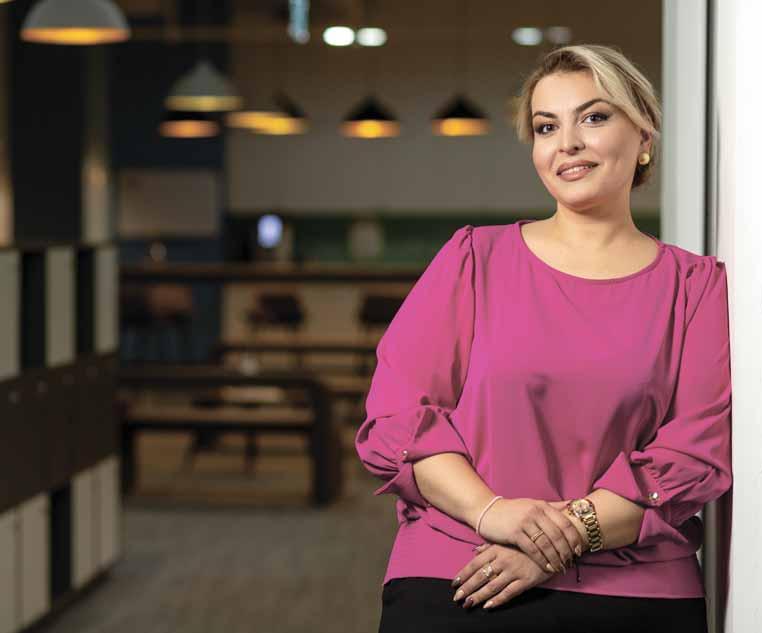
Patrik Oksanen on Sweden in NATO:
INTERVIEW BY VAZHA TAVBERIDZE
Elected as a fellow of the Royal Swedish Academy of War Sciences in 2020, Patrik Oksanen is a Swedish journalist and writer. He formerly served as the Europe correspondent of Sveriges Television. Since 2015, he’s been hosting the podcast series Podd72 on security policy, defense and information warfare. Radio Free Europe/RL’s Georgian Service sat down with him to discuss his country’s accession to NATO after 200 years of military non-alignment.
WHAT DOES BECOMING A NATO MEMBER MEAN FOR SWEDEN, NATO, AND RUSSIA?
It means that Sweden, after a long period, after the end of the Cold War, has at last come home. When NATO was founded in 1949, Sweden opted out, and that was largely because of Finland. Finland was at that time tied down by its partnership and cooperation pact with the Soviet Union, which was a consequence of World War Two. And, at that time,

Oksanen
joined NATO in 1949, there would
were thinking that if
for Finland, and that Finland
like Czechoslovakia. So we



PreparedforGeorgiaTodayBusinessby Issue no: 1439 • • MARCH 1 - 7, 2024 • • PUBLISHED WEEKLY In this week’s
PRICE: GEL 2.50
issue...
Caritas: Nurturing Agriculture in Georgia’s Regions through the Artificial Insemination of Livestock
CEC Releases Statement on NDI Recommendations
New Identity
Aerospike Unlocking the Potential of the Middle Corridor:
Georgia's Reformatted Foreign Policy: For Greater Practicality, for Greater Effectiveness. Part 1 Teddy Award for Georgian Film. Berlinale 74 Review
Opportunities with
World Bank Study Presented at Regional Event in Tbilisi
BUSINESS PAGE
POLITICS
NEWS
POLITICS
ON
NEW PERSONAL
China-Georgia Relations Making Fast Progress
7 SOCIETY PAGE 8
PAGE 4 CULTURE PAGE 11
PAGE 2
PAGE 3 POLITICS PAGE 6 FOCUS
THE
DATA PROTECTION LAW
perspective on the upcoming changes PAGE
Lawyer Gvantsa Zhorjoliani's
9
We
Closer
the
Prepared than Most Patrik
Are
to
Front Line, and that Means We Need to be More
people
stayed outside of NATO because of Finland. And when Finland decided to join, the decision was very easy for Sweden. For NATO, it means that NATO is now secured more properly on the northern flank because Swedish territory is crucial for the defense of the Baltic countries, with its strategically located islands. Continued on page 5
Sweden
be consequences
might end up

PM Vows to Stop Reorganization Process at Republican Hospital
Based on the decision reached in a meeting between doctors, the Prime Minister, and the Health Minister, the Republican Hospital’s reorganization process will be halted, and the current building will not be demolished until a new one is built. Further, a relevant legal document will be prepared, said Prime Minister Irakli Kobakhidze.
To the question as to whether the proposal on compensation would be declared null and void for those physicians who signed it, the PM said that the details would be finalized shortly.
“As for other issues, we will hold talks with both the hospital staff and Health Ministry. No problems should exist for the hospital to continue work at full
capacity,” he said.
Kobakhidze further remarked that a new hospital would be constructed in several years. He said the sustainability of the current building was not at risk and measures would be taken to improve the infrastructure that would “best serve the interests of both the state and medical personnel.”
Republican Hospital medical personnel gathered today to express their gratitude for the decision made by Prime Minister Kobakhidze regarding the suspension of the dismantling of the Republican Hospital building. The doctors considered this decision an essential step and extended their thanks to all individuals involved in this decision.
Rehabilitation of the Access Road to Gomismta to Cost 18.8 mln GEL
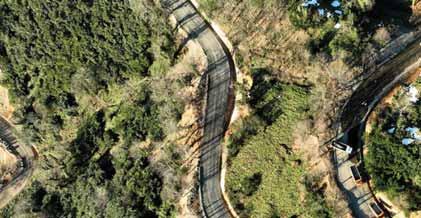 BY MARIAM MTIVLISHVILI
BY MARIAM MTIVLISHVILI
Rehabilitation works on the 21 km section of the Ozurgeti-Shemokmedi-BjujhesiGomismta highway are underway, for which 18.8
million GEL has been allocated from the state budget. “The road starts in the territory of Bjujhesi and ends in the Gomismta resort. Accordingly, the arrangement of the road infrastructure on this section is important for the safe and comfortable movement of tourists and visitors,” the Roads Department of Georgia stated.
Unlocking the Potential of the Middle Corridor: World Bank Study Presented at Regional Event in Tbilisi
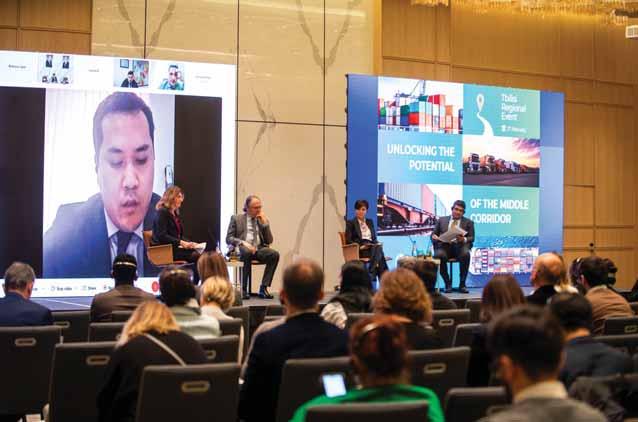
On February 27, a hybrid regional event hosted by the World Bank discussed a comprehensive study, "The Middle Trade and Transport Corridor: Policies and Investments to Triple Freight Volumes and Halve Travel Time by 2030."
The report provides an in-depth assessment of the expected demand for the Middle Corridor and offers a detailed diagnostic of the infrastructure, logistics services capacity and constraints in three countries along this route, which spans Azerbaijan, Georgia, and Kazakhstan.
The event, "Unlocking the Potential of the Middle Corridor", served as a platform for collaborative discussion on improving the operational efficiency of the Middle Corridor and addressing existing bottlenecks. Government representatives from Armenia, Azerbaijan, Georgia, and Kazakhstan stakeholders
from the private sector, development partners, think-tanks and academia gathered to discuss the key findings of the World Bank’s study, with a strong emphasis on moving from analysis to action.
The Middle Corridor’s significance and strength lie in the benefits it can bring as an intraregional trade corridor.
Increased trade between Azerbaijan, Georgia, Kazakhstan, and Europe are the key drivers of demand—including a potential 37% increase in intra-regional trade and a 28% increase in trade between these three countries and the European Union by 2030.
The report identifies key policies and investments needed to respond to the demand for transport and to support economic development in Azerbaijan, Georgia, and Kazakhstan, which include:
• Providing logistics solutions along the Corridor to ensure seamless operations.
• Reforming and simplifying processes and procedures, particularly at border crossings, to smooth out exchanges of traffic and data – issues that are characteristic of multimodal corridors, which combine different forms of transportation.
• Coordinating digitalization to increase tracking and to reduce delays at borders and operational interfaces. A unified, interoperable framework can facilitate digital transformation of processes and activities in the corridor.
• Improving performance at the Caspian and Black Sea crossings, with a focus on removing bottlenecks to vessel availability and improving port productivity.
• Agreeing on a uniform investment prioritization system.
The report identifies several investment opportunities that should be further evaluated and sequenced.
Ukraine Latest: Moscow-Installed Governors Allegedly Poisoned in Ukraine, Ukraine’s Troops under Attack in Zaporizhzhia
COMPILED BY ANA
DUMBADZE
Russia’s defense ministry said on Monday that Ukraine had poisoned the Moscowinstalled governors of Ukraine’s Kherson and Luhansk regions, though both had survived.
In an online briefing, Moscow said Ukraine poisoned Moscow-appointed Kherson head Vladimir Saldo in August 2022, and Luhansk governor Leonid Pasechnik in December 2023.
The Kherson and Luhansk regions were among four Ukrainian provinces that Russia declared it had annexed in September 2022, even though it did not fully control any of them.
Both Russian and Ukrainian media reported Saldo’s 2022 poisoning at the time. Russian-installed authorities in Kherson said in August 2022 that Saldo had fallen sick, but did not say that he had been poisoned. Saldo has since returned to public prominence in the Russian-controlled part of Kherson region.
According to unconfirmed reports, Saldo may have been poisoned by his chef.
Pasechnik’s alleged poisoning had not been previously reported, however. The defense ministry said he was “severely poisoned with phenolic compounds’.
On 11 December, less than a week after his alleged poisoning, Pasechnik was shown at a press conference in Moscow and appeared healthy.
There have been numerous Ukrainian attacks targeting Moscow-installed puppet officials since Vladimir Putin ordered the full-scale invasion of Ukraine in 2022.
UKRAINE TROOPS UNDER ATTACK IN ZAPORIZHZHIA
Ukrainian troops are facing “heavy fire” from Russian forces in the southern Zaporizhzhia region, a Ukrainian army spokesperson was quoted by AFP as saying. It comes after Russia said it had taken full control of the eastern Ukrainian city of Avdiivka, its biggest gain since capturing Bakhmut last May, after a retreat by Ukrainian troops.
RUSSIA SAYS IT MAY TAKE ‘RETALIATORY MEASURES’ AS SWEDEN JOINS NATO
Russia on Wednesday said it regrets that Sweden is set to join NATO and pledged to take some retaliatory measures to protect itself.
“Russia will take retaliatory measures of a political and military-technical nature in order to stop threats to its national security. Their specific content will depend on the conditions and scale of Sweden’s integration into NATO, including the possible deployment of NATO troops, strike systems and weapons on the territory of this country,” the Russian Foreign Ministry said in a post via Telegram.
Russia said that while security matters are a sovereign question for Sweden, the move would have a negative impact on northern Europe’s stability and the Baltic Sea region, which is shared by Sweden, Russia and various other countries.
Sweden bid to join NATO, where an attack on one member country is seen as an attack on all members, following Russia’s full-scale invasion of Ukraine in 2022. After long-standing opposition, Hungary on Monday voted to approve
the bid, clearing the way for Sweden to join the alliance.
LEADERS SHOULD CONSIDER USING FROZEN RUSSIAN ASSETS TO BOLSTER UKRAINE’S MILITARY, EU’S VON DER LEYEN SAYS
European leaders should discuss using the profits from frozen Russian assets to boost Ukraine’s military, European Commission President Ursula von der Leyen said Wednesday.
“It is time to start a conversation about using the windfall profits of frozen Russian assets to jointly purchase military equipment for Ukraine,” she said in a speech before the European Parliament.
“There could be no stronger symbol and no greater use for that money than to make Ukraine and all of Europe a safer place to live,” von der Leyen noted.
Von der Leyen’s comments come after US Treasury Secretary Janet Yellen on Tuesday said it is important to find a way to unlock the value of frozen assets to bolster Ukraine, stressing there is a “strong international law, economic and moral case” to do so, and that it was crucial for
allies to work together on the matter.
OTHER KEY DEVELOPMENTS:
Ukraine’s military said it shot down two more Russian warplanes used to drop highly destructive guided aerial bombs on Kyiv’s troops, army chief Oleksandr Syrskyi said. The destroyed planes were an Su-34 fighter-bomber and an Su-35 fighter, Syrskyi wrote on Telegram.
Over the weekend, Ukraine said it shot down three Russian Su-34s and one Su-35.
Speaking on his way into the summit of foreign ministers in Brussels on Monday, Estonia’s foreign minister, Margus Tsahkna, called Vladimir Putin a “murderer” and said Ukraine urgently needs more ammunition.
The Kremlin said that the West’s reaction to Alexei Navalny’s death was “absolutely unacceptable”. “We consider it absolutely unacceptable to make such, well, frankly obnoxious statements,” the Kremlin’s spokesperson, Dmitry Peskov, told reporters.
Belgium’s foreign minister, Hadja Lahbib, has called on the EU to develop an army amid increasing nervousness about Russia’s capacity to defeat Ukraine.
GEORGIA TODAY MARCH 1 7, 2024 2 NEWS
China-Georgia Relations Making Fast Progress
BY TEAM GT
On February 26, Georgian Prime Minister Irakli Kobakhidze announced that the Chinese Government had made a decision to introduce visa-free travel to the country for Georgian citizens. He noted that Georgian nationals would be able to stay in China without a visa for up to 30 days.
“China has decided to introduce visafree travel for Georgian citizens. Citizens of Georgia will be able to spend 30 consecutive days in China without a visa. This is an important decision that will make it easier for our fellow citizens to travel to China, and one that will create new opportunities for further development of political, economic and cultural ties between the two countries,” the PM said, highlighting that the decision was “another important practical result” of the strategic partnership agreement signed between the two states last year.
Georgia's Vice Prime Minister, Levan Davitashvili, also spoke positively of the news.
“Our citizens will be given the opportunity to travel to China without any barriers, and this will promote relations between the countries. First of all, it will be very important from the point of view of trade and economy, because China is an important trade partner for Georgia. Many citizens have been traveling to China for economic relations, but it was not easy. Visa-free travel will make this process easier,” Davitashvili said.
Earlier, on February 23, PM Kobakhidze, at a press conference held in the Administration of the Government of Georgia, reminded those present that Georgia had signed a free trade agreement with China which contributed to the develop-
ment of trade and economic relations.
“We see great interest from China in deepening relations, which is also reflected in daily steps. For example, we have very active trade and economic relations. Chinese companies are very actively involved in economic relations in order to properly implement relevant projects,” Kobakhidze said.
In January, Davitashvili highlighted that, along with the challenges, there are many opportunities in the world that can be taken advantage of by countries only through cooperation, and that Georgia “is part of this trend.” He said that the Georgian authorities had correctly assessed the situation when they started talking about prospective economic cooperation with China, and emphasized that China is a strategic partner of Georgia, and the dialogue between the countries is ongoing on the implementation of very important, strategic projects, in which Chinese business can play an important role in boosting Georgia's economy.
"At the Davos Economic Forum this year, the Chinese delegation was represented at the highest level, under the leadership of their Prime Minister. This emphasizes that the world needs more cooperation to overcome global challenges, and it is impossible to talk about overcoming said challenges without the participation of China," Davitashvili claimed.
At the end of December, an agreement was signed between the Government of Georgia and the Government of the People's Republic of China on international road transportation of passengers and cargo, which provides for the exchange of bilateral and transit transportation quotas for carriers registered in both Georgia and the People's Republic of China.
According to the data of the 10th month of 2023, approximately 528.9 thousand tons were transported between Georgia
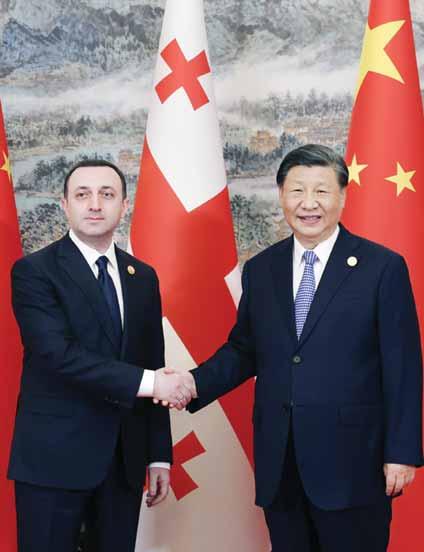
and China by road/sea transport, which is 4.1% more than the same period of 2022. The development of direct road traffic will help to further increase the mentioned indicators.
In the summer of 2023, the Georgian
Government Administration released a joint statement on the establishment of a strategic partnership between Georgia and China. The document comprises four domains: Political, economic, people-to-people/cultural, and international
and was agreed on with then-PM Irakli Garibashvili, at the opening ceremony of the 31st Chengdu FISU World University Games in China.
During the visit, President Xi Jinping met with Garibashvili in Chengdu, and Premier Li Qiang met with him in Beijing.
Both sides are said to share the view that since the establishment of diplomatic relations between the two countries on June 9, 1992, bilateral cooperation has witnessed fruitful results in various fields. In the context of profound and complex evolution of the international and regional situation, both sides share the commitment to expanding cooperation in the political, economic and cultural fields, strengthening collaboration in international affairs, deepening bilateral relations, and safeguarding regional and world peace, stability and development together.
“While everyone else tries to become more economically independent from China, Georgia again takes another turn. Helping Russia with circumventing the sanctions, deepening the economic ties with China, that all looks like the right turn towards Europe/EU … *irony off*”, MEP Viola Von Cramon tweeted after the announcement.
“China and Georgia are independent countries, we have the right to make a choice as to who is our partner, who is our strategic partner,” Ambassador of China to Georgia Zhou Qian said. “China and the EU have a comprehensive strategic partnership, and my personal view is that without China and the EU, there will be no success for the Middle Corridor, because what's important for the Middle Corridor is the logistics between China and the EU; manufacturing power and goods power from China ending up in consumer markets. It means that without support from China and the EU, there would be no success for the Middle Corridor.”
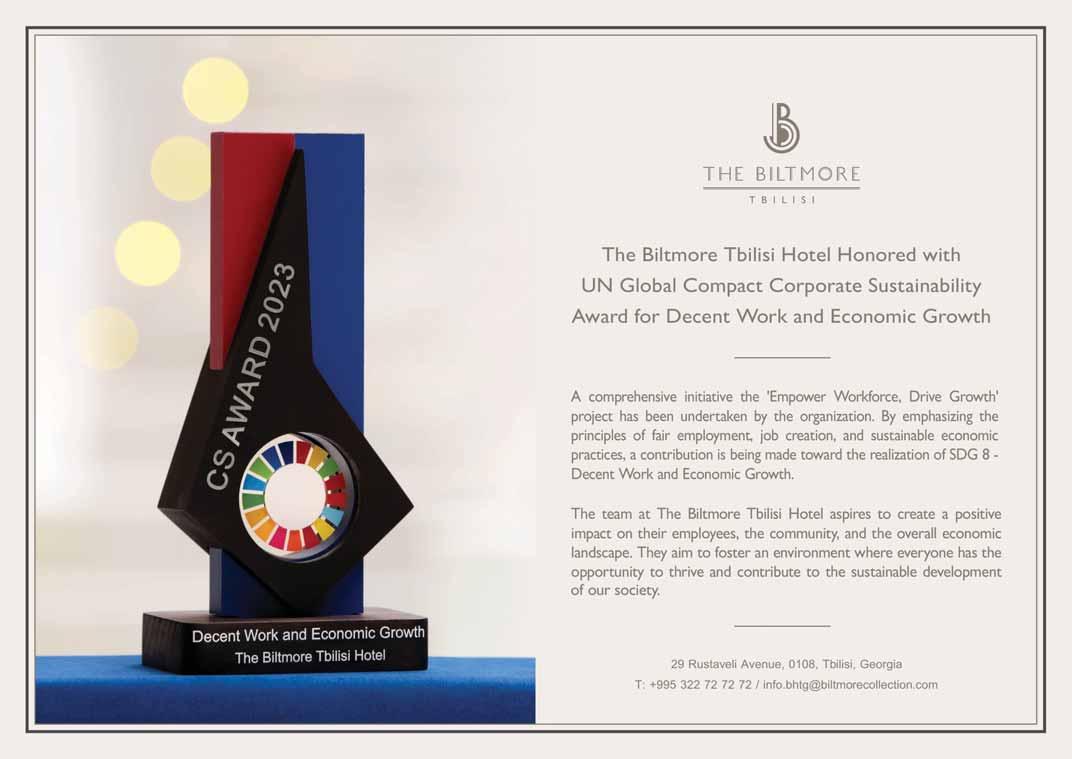
GEORGIA TODAY MARCH 1 - 7, 2024 3 POLITICS
President Xi Jinping meets with Georgian Prime Minister Irakli Garibashvili in Chengdu on July 28, 2023. Source: Xinhua
The World’s Polarity & Our Place in It
OP-ED BY NUGZAR B. RUHADZE
Lately, there has been a lot of talk about the polarity of the world and its sporadic changeability, the variableness of this geopolitical phenomenon being utterly unpredictable. The number of classic models of the world’s polarity is limited to three – unipolar, bipolar and multipolar. One of the most popular neorealists, the famed American scholar of political science, Professor John Mearsheimer, would often comment on the polaristic character of our contemporary world, emphasizing that the postwar bipolar world, even though it was afflicted with the cold-war perils and misgivings, was still more balanced than the after-perestroika monopolar world led by the United States of America in its boring unilateral solitude, taken for granted by Mankind in the last thirtyodd years. But, as mutable as the modern world seems to be, its polarity is currently going through a new metamorphosis, precipitously headed for multipolarity, with America, China and Russia residing at the top.
This said, any model of the world’s polarity can be said to be natural and acceptable enough for Mankind not to have to worry too much about the quantity of its geopolitical pinnacles and their influence over our fates. Sitting somewhere in the world, in some pretty, exotic spot, in a cozy little catering outlet, one might be totally nonchalant of anything that is going on around the globe, so I
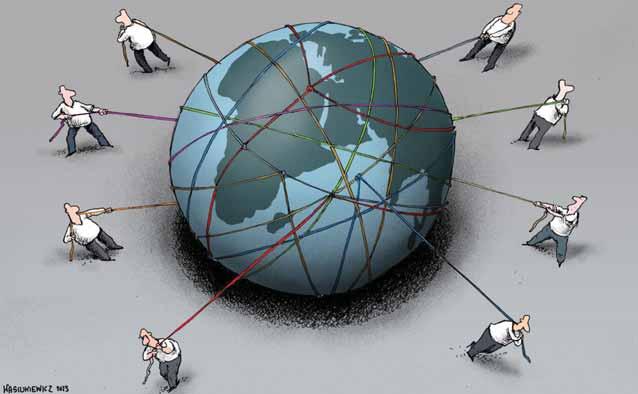
Image source: gisreportsonline
wonder if Sakartvelo has to be worried about anything that might potentially bother the unsuspecting Georgians who, as we speak, are happily attending their compulsory schools, hopefully growing into good and healthy grownups of their beloved motherland.
Yet, the generally accepted cogent assumption is that anything that’s happening in today’s world concerns Georgia too. I only wonder if Georgia really
needs to be worried whether the world is mono, bi or multi polar. Any self-confident political scientist would probably say in the most assured fashion that the character of polarity of the planet has a direct effect on us, and they might be right, but not many of them would be very clear about the specificity of their notion.
Imagine the world was still bipolar, as it used to be until those roaring 90s.
How would that alter the way of life in this country? In no way, presumably! Our vital interests would probably continue to be the same, affordably manipulating between the two poles. When the world became monopolar, Georgia tried to singularize its foreign vector, giving an impetus to the dream of becoming a member of the western military block which never came true, and goodness knows if it will ever come to frui-
tion. Now that the world is intensively getting ready to morph into a long awaited multipolar modus vivendi and operandi, Georgia is not changing much in terms of its geopolitical aspirations, economic potential or cultural ways, remaining a little Eurasian sovereign nation with moderately demonstrated features of an international player and slightly improved chances of making some progress on its way to a stronger image and better life.
To trivially conclude, it’s not exactly our national headache to worry much about the world’s polarity, because Georgia can easily adapt its modest self to any model of polarity if it finds optimal ways to reasonably coexist with the rest of the world, so that wolves are fed and sheep are kept safe too, at all possible times. Some might object to this somewhat lighthearted assumption, using a witty deduction like ‘you can’t have the cake and eat it too’ but the hard and sweated-for national practice of the last 35 years corroborates the former postulation that our most optimal path is to carefully watch the way the world is developing, and to gingerly tap every possible opportunity for development, and to do our business as independently as possible from the ongoing confusing and scary interplay of the famous biggies of the world, who will never desist from the idea that the world is theirs alone, and that the entire stock of whip and carrot belongs only in their hands to handle its distribution so that, again, the entire pack of wolves is fed and the flock of sheep is safe.
CEC Releases Statement on NDI Recommendations
The Election Administration (EA) of Georgia actively continues its work to ensure the execution of the October 26, 2024 Elections with utmost professionalism, they claim.
“To ensure that the Parliamentary Elections adhere fully to international standards, particularly concerning the integration of electronic technologies, the EA is intensively studying the practices around the globe, alongside the perspectives and recommendations of esteemed international organizations, reads the statement issued by the Central Election Commission regarding the NDI recommendations.
“The National Democratic Institute (NDI) has already completed the first pre-election observation mission for the October 26 Elections, published the report, and developed recommendations for the Parliamentary Elections.”
According to the report, “The CEC is a highly professional and competent election management body that has, in past elections, demonstrated its technical expertise to conduct election day processes in a generally orderly fashion and in accordance with Georgian law”. The report comprises several recommendations concerning the CEC.
Recommendation 1:
“The CEC should redouble its efforts to address any unsubstantiated rumors about the secrecy of the vote and work with all political parties and civil society to assure the public, including marginalized communities, that their vote is their secret through substantial voter education efforts”.
Preserving the confidentiality of the voting process stands as paramount for the Election Administration. Therefore, during the implementation of electronic technologies, after consulting with relevant stakeholders, a specific frame form was developed, along with guidelines for inserting the ballot paper into the vote-counting machine, to ensure vote secrecy. Moreover, ensuring the confidentiality of voting stands as a pivotal focal point within the Election Administration’s informational outreach endeavors.
Recommendation 2:
“The CEC should consider, as has
been the case in other countries, conducting a nationwide test of new technologies that mirrors conditions of election day to further enhance public confidence”.
The EA started introducing electronic technologies in the election process in 2018. Until 2024, 8 (by/extraordinary) elections were held in pilot mode using electronic technologies. Furthermore, it’s noteworthy that well in advance— almost a year and a half preceding the October 26 Elections—a comprehensive information campaign was initiated, drawing upon the best international practices. As part of this campaign, voters have the opportunity to personally acquaint themselves with the operation of electronic voting machines and engage in mock elections. In 2023, over 1,700 informational meetings were conducted nationwide, reaching approximately 150,000 voters. By the year 2024, up to 300,000 voters had been educated on the utilization of electronic voting technologies. Notably, among these, up to 122,000 voters actively participated in elections utilizing these new technologies. The awareness campaign is being conducted with even greater intensity this year.
Recommendation 3:
“The CEC should ensure the full participation of marginalized groups, especially ethnic minorities and persons with disabilities, in the elections by providing appropriate accommodations and voter education materials tailored to these groups’ needs”.
As for the recommendation regarding the full participation of ethnic minorities and persons with disabilities in the elections, the Election Administration carries out numerous activities in this direction.
Special groups working on the issues of ethnic minorities and persons with disabilities are established at the CEC, where representatives of organizations working on relevant issues are represented as members, and all-important issues are being discussed with them.
The following services are provided for their participation in elections: a frame form for blind voters assisting them to fill in the electoral ballot; magnifying lens for people with visual impair-
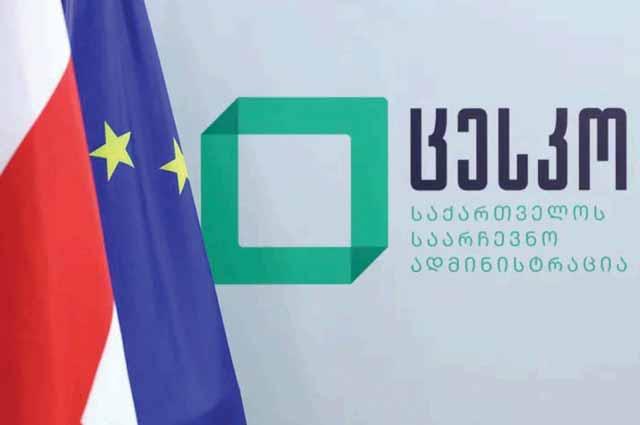
ments; voting booths at polling stations adapted/accessible for wheelchair users; voting poster with QR code, in sign language for deaf people, and audio format for blind people.
On the CEC website, blind persons can independently check their data in the unified list of voters, during the election period, in the contact hub deaf persons can apply the services of an operator who communicates using sign language.
As for the representatives of ethnic minorities, they have an opportunity to verify their data in the unified list of voters, as well as receive contact hub operator services in Azerbaijani and Armenian languages during the election period. For their participation in the elections, the unified list of voters, the ballot, the rules for filling out the ballot paper, and the poster depicting the participation in the voting are also translated into ethnic minority languages.
Informational video clips are translated into ethnic minority languages and vid-
eos are provided with sign language interpretation.
Informational campaigns on the introduction of electronic technologies in the election process also include holding informational meetings in regions populated by ethnic minorities.
Recently, in cooperation with the International Foundation for Electoral Systems (IFES), a video was prepared about services for persons with disabilities. The video was also translated into the languages of ethnic minorities.
Recommendation 4:
“The CEC and the Ministry of Foreign Affairs (MFA) should provide greater transparency on the process for determining the location of polling stations outside of Georgia and facilitating, to the degree possible, voting access for citizens abroad”.
In this direction, the election administration acts in full compliance with the legislation and plans an active information campaign for voters abroad.
It should be underlined that the Election Administration will continue to consult with the National Democratic Institute (NDI) and other electoral stakeholders on all the mentioned recommendations to make sure there are no questions regarding the implementation of the recommendations.
“To conclude, we would like to agree with the observation mission’s opinion and repeat the statement which once again confirms the fact that the elections are a common cause: “While the government has the responsibility for creating an enabling environment for elections and the CEC is the constitutionally mandated body for conducting elections, ultimately it is the responsibility of all election stakeholders, including all parties, civic organizations, and media, to show the country’s commitment to democratic norms and ensure that the electorate is well informed and engaged ahead of the elections,” – states the NDI report.
GEORGIA TODAY MARCH 1 7, 2024 4 POLITICS
Patrik Oksanen on Sweden in NATO: We Are Closer to the Front Line, and that Means We Need to be More Prepared than Most
Continued from page 1
And Finland is more easily defended too. Sweden is a country that lies strategically as a logistical hub and support area for the frontlines states. And look at what Sweden contributes: It has a good Air Force, good submarines, high technology, a small but good Navy and also competence in Arctic winter warfare, because, even though our armed forces are small, they are highly competent.
For Russia, it’s a strategic failure, because one of the key issues for Russia has been to keep Finland and Sweden out of NATO. This is a strategic setback for Russia, and it means that it should be harder for them to drive wedges between countries, and that means that they have to take more consideration into account when they think about the strategic map.
A VERY POPULAR TURN OF PHRASE ON SWEDEN AND FINLAND BECOMING NATO MEMBERS HAS BEEN THAT THE BALTIC SEA WILL BECOME A “NATO LAKE.” HOW DO WE EXPECT RUSSIA TO REACT TO THAT?
Well, first of all, I don’t subscribe to that thesis, I think it's intellectually sloppy, and it leads us to the wrong conclusion. Russia is pushed back in the Baltic Sea, but it's not been made into a “NATO lake.” We should expect more hybrid activities, yes, but Russia will try to contest the lake idea as much as possible by various means, even if they are pushed back geographically in the area. So I would argue that Russia will still be able to create problems - it will be much harder for them, sure, but it will not be uncontested, it won’t turn into a NATO lake.
PUTIN SAID HE “HAD NO PROBLEM WITH SWEDEN AND FINLAND BECOMING NATO MEMBERS, AS LONG AS NATO INFRASTRUCTURE IS NOT INSTALLED THERE.”
SHOULD WE EXPECT SUCH NATO INFRASTRUCTURE IN SWEDEN?
First of all, we should never listen to what Putin says. He's a liar, and he changes what he says as it suits him. And secondly, that will be something that Finland and Sweden decide together with our NATO partners, without Russia’s say-so. With both Finland and Sweden extending their security cooperation with the US, you can expect larger-scale cooperation, but it's too early to say what will happen in the longer perspective, and I guess that it also depends on what's happening in the region.
WILL THE SWEDES GO TO WAR AGAINST RUSSIA IF PUTIN ATTACKS ONE OF THEIR NUMEROUS SMALL ISLANDS?
Well, Gotland, for example, is a strategically important one, and Sweden would definitely go to war to defend it, even without NATO membership, and I would have expected other countries to have helped, regardless. Now Gotland is Article Five territory, so that ambiguity, wondering what could happen, is not there anymore. It's Article Five.
SWEDEN BECOMING A NATO MEMBER IS A MERE FORMALITY NOW, BUT WHAT DID IT COST SWEDEN TO GET GREENLIGHTS FROM ERDOGAN AND ORBAN?
I would argue that that the practical costs weren't that that big, but we did get taught a lesson in Realpolitik- we had a bit of a reality check. Sweden had to realize that when it comes to NATO, it's not only bilateral things in play here, it's a three-dimensional chessboard. I mean, for example, there was this issue with Turkey and the F-16s. It wasn’t merely an issue between Ankara and Stockholm. Then,

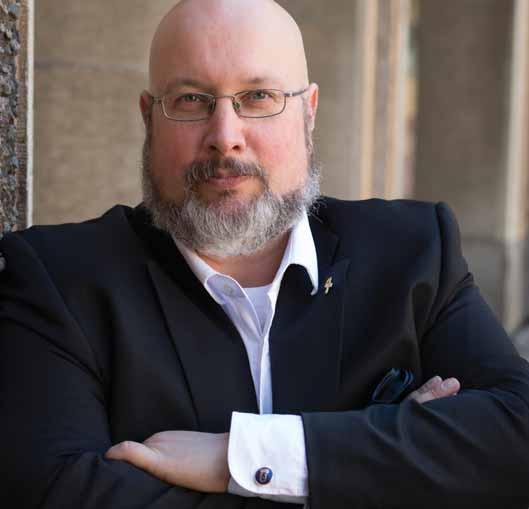
Patrik Oksanen with Hungary, we sold them a couple more Gripen planes. But that's not a problem.
SWEDEN IS TO PROVIDE ITS HITHERTO LARGEST MILITARY SUPPORT PACKAGE TO UKRAINE, 700 MILLION USD. WILL WE SEE NATO-MEMBER
SWEDEN PROVIDING JAS-39 GRIPEN FIGHTER JETS TO UKRAINE TOO?
My expectation is that when Sweden is a NATO member, providing Gripen to Ukraine will be on the table. And I expect it to be a quick decision, since there is a lot of support for that in Sweden, both in parliament and among Swedish society. But after making that decision, it will take a much longer time to do the proper training of the pilots, prepare the ground support and so on.
THE DANISH PRIME MINISTER RECENTLY PLEDGED THEIR ENTIRE ARTILLERY SHELL RESERVES TO THE UKRAINIAN CAUSE. HOW LIKELY IS SWEDEN TO FOLLOW SUIT?
If you look at the geography of Sweden, you will realize why is it that we don't have the luxury like the Danes to give away all the artillery shells we’ve got. So we will not empty all our ammunition stores. But what we are seeing is that Sweden is trying to ramp up ammunition production, and there are investments that will increase the volume, because what we're seeing is a conflict that will be dragging on for a long time, and which will have an industrial warfare element to it. We see a need both to provide Ukraine with more ammunition and also to fill up our own stores. I expect our military buildup will continue, and we will try to increase the pace. We are building up the total defense concept that we abandoned during the period of peace after the Cold War; we are moving to be ready to deal with whatever comes our way. How ready are we and when? Hard to
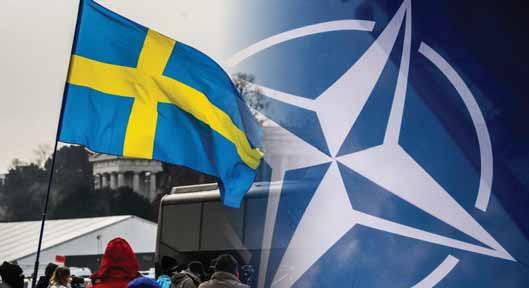
say, but we are moving in that direction. There is huge, huge public support for Ukraine in Sweden; there is a huge understanding of what kind of threat the Putin regime poses to peace and stability in our part of the world. So, in that sense, we are more prepared than many other European countries. For example, unlike many other countries, we aren’t debating whether the problem is
real or not. We’re fully aware it’s very real. WITH THAT MINDSET, I SUPPOSE SWEDEN WOULD HAVE NO QUALMS ABOUT MEETING THE 2% THRESHOLD OF THE DEFENSE SPENDING THAT NATO REQUIRES AND OTHER COUNTRIES KEEP FALLING SHORT OF?
We are passing the NATO threshold on our own, and we will continue to increase that in the coming years. And I expect that the Defense Commission that is in the works will propose that we plan for a level that is much higher than 2% of GDP in the coming years 2026 to 2030. There is a big, big understanding in Sweden that 2% is not the roof, 2% is more like the ground floor. We are closer to the front line, and that means that we need to be more prepared than most. We need to build up more.
SWEDEN HAD TO WAIT TWO YEARS TO JOIN NATO, BUT COUNTRIES LIKE UKRAINE AND GEORGIA HAVE BEEN WAITING FOR MORE THAN A DECADE. CAN THEY COUNT ON STOCKHOLM’S SUPPORT IN MAKING THAT FINAL STEP FORWARD?
Sweden is committed to the open door policy. The Swedish long-term strategic perspective entails the support of the Western integration, both into the European Union and NATO, of Ukraine and Georgia. Sweden has been working to that end in the EU for a long time, in the Eastern partnership framework.
IF PUTIN DECIDES MOLDOVA AND GEORGIA ARE RIPE FOR THE TAKING BEFORE THAT POINT, WHAT KIND OF REACTION SHOULD WE EXPECT FROM NATO IN GENERAL, AND SWEDEN IN PARTICULAR?
It’s a very good question, and I wish I had a good answer. I can only say that we should mentally and physically adjust to the fact that Putin seems determined to restore a Russian empire of sorts and be prepared to counter that, to rise up to the challenge.

GEORGIA TODAY MARCH 1 - 7, 2024 5 POLITICS
Image source: The Wall Street Journal
Georgia's Reformatted Foreign Policy: For Greater Practicality, for Greater Effectiveness. Part 1
ANALYSIS BY VICTOR KIPIANI, GEOCASE CHAIRMAN
Foreign policy has never been a linear endeavor, and one could always read in the visible or hidden movements of its creation the successful or unsuccessful operation of a complex mechanism. As the system of international relations has evolved, this mechanism has become increasingly complex and comprehensive. Its effective utilization, along with direct costs, has required the use of many new types of resources that many countries and actors have to draw upon along the way.
CURRENT REALITIES
In real time, this practical "training course" has been supplemented by the fact that today the clear line between white and black has been erased, the previously known "extremes" have shifted towards each other, the absoluteness of assessments and even more so, action, has become somewhere useless, and somewhere directly risky.
This disruption in global order produced a "disorderly order" in which one or another predetermined grand strategy led to narrowness and crudeness in navigating the outer course. At the same time, paving the way for one's own interests in a world order "without planning," and even partially ensuring one's own security, places a particularly heavy burden on small countries.
The fate of small countries has not been easy before. However, in our time, this fate is further aggravated by such realities as the declining role of international law, ignoring the reputation factor in the implementation of the agreements reached for reconciliation and harmonization of the interests of global or regional actors, subordination of these interests to one big "trade exchange", and "delicate" violation of declared principles or ideals by the needs of "trade".
These and a number of other reasons led to the adoption of qualitatively new approaches as official policy. For example, the so-called Balancing Policy was actually introduced in the foreign arena, the relevance of which is increasing against the background of the war in Ukraine and other military conflicts. Such balancing, or, to put it differently, maneuvering, in the absence of clear
lines and rules of the game in the system (or in the systemlessness) of international relations, is associated if not with the full protection of national interests, then at least with their temporary preservation.
Moreover, the so-called practice of balancing, which should by no means be unquestionably equated with unprincipledness, has become part of the geopolitical handwriting not only of small and medium-sized countries, but also of large ones. At the current stage of policy creation, the existing methods of minimizing threats and realizing one's own interests are constantly changing: both their form and content are undergoing modifications. Thus, for example, the emergence of the phenomenon of the so-called Swing State should be attributed to the type of content changes. Let us now temporarily set aside the question of its etymology and correct Georgian definition. The main point is still the essence, according to which a country (especially a small and mediumsized one) should pursue a rational policy of such quality that would create prerequisites for taking into account the national interest of this country by major geopolitical centers or, at least, avoiding encroachments on it.
Perhaps for some it is controversial, but we would still say that given the created realities, even large countries are not always known for a direct foreign policy line, despite their declared principles. Moreover, if we take the example of the United States of America, this global player is clearly trying to solve the problems of a particular given at the expense of situational partnerships with democratic, hybrid or autocratic regimes. It is also worth noting that such a situational partnership, driven by necessity, is openly permissible for the US national security strategy and, in a sense, gives the aforementioned Swing State connotation to this country's foreign policy.
In connection with the above, the article published in the January issue of this year of the authoritative magazine Foreign Affairs by William Burns, Head of the Central Intelligence Agency of the United States of America, is significant. Discussing a number of issues, Burns points to the growing demand for hedging (i.e., balancing) by "middle ground" countries. The influential US diplomat and senior intelligence officer emphasizes that whether democracies or autocracies, developed or developing econo-

mies, they all exhibit a growing tendency to "diversify relationships to maximize choices." Moreover, he recognizes that "few benefits and many risks" come from "monogamous geopolitical relations" (i.e. exclusive relations with one particular country - definition by the author of this article) and notes that "geopolitically 'open' status" may become more acceptable to countries. We believe that after citing these considerations, our reasoning that we develop in this article will be taken adequately and will be spared from attaching toxic clichés and hackneyed labels.
In short, where modern international politics for large or medium-sized countries means moving along a risky trajectory of endless discoveries and surprises, the situation is exceptionally opposite for small countries that have no special political, economic and financial, military or lobbying resources to advocate for their own national interests.
And the purpose of this article is to talk about the peculiarities of creation and realization of Georgia's foreign policy taking into account the mentioned circumstances and contradictions, as well as to point out some practical considerations that will make our efforts more effective and realistic. In other words, this is an open and non-reverential discussion of the contours and prospects of a newly understood Georgian foreign policy, the so-called "Georgian Path".
INTRODUCTION FOR BETTER CONTEXT
Before concretizing and formulating the principles of upgrading our foreign policy (and not only) line, let us also remind ourselves and the readers of some contextual issues:
Let us start with the banal postulate that geography has been, is and will remain an essential determinant of Georgia's foreign policy making. It is
quite enough to mention the all too popular connotations of "geopolitics" and "geo-economics" alone.
We have mentioned geography, and whether we like it or not ("idealists" and "internationalists" will be very much against this opinion), the division of geopolitical geographies into so-called "spheres of influence" or "zones of interest" will remain relevant for the foreseeable future. In this respect, the main concern of countries caught between "zones" and "spheres" will probably be reducing the harmful impact on them, hedging (reinsuring) their interests in the conditions of opposing influences, and optimizing the available opportunities for their own security.
In addition, we should keep in mind the even more prominent place of regionalism and regional geopolitical hubs in the system of international relations. Accordingly, we need to be able to implement the two-frequency institutionalization of Georgia's foreign policy more instrumentally and without excessive emotionality, namely: (a) the steadiness of the Euro-Atlantic integration course determined by the constitutional order of the country, and (b) constant observation, measurement and appropriate response to regional processes, especially against the background of the complex processes of the South Caucasus and the wider Black Sea region.
While integration into European and Euro-Atlantic structures is a reinsurance of Georgia's systemic security foundations, Georgia's regional policy should proactively serve to minimize and prevent situational risks "near and around us".
And finally: In the conditions of geopolitical "trade", so-called transactional politics, the priority task of Georgia's foreign policy remains that we somehow manage to prevent the "misappropriation" of our country's interests behind our back. This task will become
much more difficult in the wake of the gradual strengthening of radical-extremist and populist-isolationist tendencies among our strategic partners - the United States and the European Union. Accordingly, the call: "No decisions and negotiations on Georgia without Georgia (!)", will become realistically possible only through maximum mobilization of our own national resources, consolidation of intellectual potential of modern standard in a nonpartisan and depoliticized environment.
ON THE UPGRADED FUNDAMENTALS, IN SHORT AND TO THE POINT
Georgian foreign policy handwriting has gone through several stages of formation. In our opinion, the characteristics of each stage were influenced by the following factors: (a) the situation inside and outside the country at a particular stage; (b) the characterization of a particular top political figure of the country and his personal outlook; (c) personal and professional qualities of a particular head (leadership) of the foreign affairs agency and (d) the real role of the foreign affairs agency and the efficiency factor in shaping the country's foreign policy. The latter factor is all the more important because under the conditions of weak institutional development of the Georgian state, the functionality of this agency was not always organized in a way that is characteristic of a well-functioning system of governance. Unfortunately, with the country's political elite failing to properly recognize the importance of a self-sufficient and meritocratic foreign diplomatic institution, and this institution lacking the strength, courage and resources to properly establish itself in response to current and future challenges, the problem still exists today.
To be continued in next week’s GT.
US Ambassador: We Want Georgia to be a Member of the European Union
We want Georgia to be a member of the European Union. I know that many of you have worked very hard to achieve this, and I know that you will work even harder in the coming months and years in the legislative and other necessary directions to make the 9 priorities a reality. The United States of America will continue to support you in this effort, – US Ambassador to Georgia Robin Dunnigan said during her speech at the Foreign Relations Committee of the Parliament of Georgia this week.
The Ambassador expressed her hope that the Georgian Government will cooperate closely with civil society, because, in the end, “consensus and unity within Georgian society will be necessary for EU membership.”
“Georgia’s EU candidate status received last December is a big step forward. Congratulations again! We want Georgia to be a member of the European Union.
I know that many of you have worked very hard to achieve this, and I know that you will work even harder in the coming months and years in legislative and other necessary directions to ensure that the 9 priorities are met. The United States of America will continue to support you in this effort. We also hope that you will work closely with civil society organizations and all segments of society to take this process forward. Ultimately, consensus and unity within Georgian society will be needed to achieve EU membership.
“One of the first things I did after I arrived in Georgia was to travel to Brussels to talk to EU officials about Georgia’s candidate status and what the United States could contribute [to the process]. We are now working daily with the EU, Georgia and others to see how our assistance can be most useful in the work you are doing in meeting the 9 requirements.
“I was very happy to see that the first trip of the Prime Minister of Georgia
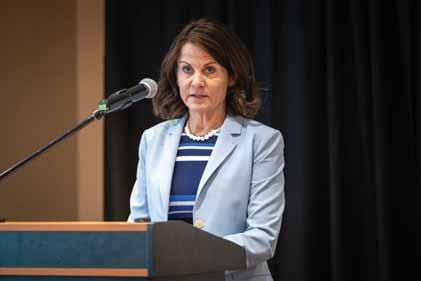
was to Brussels to meet with the high officials of the European Union and discuss Georgia’s candidate status. Also, I am glad to see that the Prime Minister of Georgia met with NATO representa-
tives and once again confirmed Georgia’s NATO-EU aspirations, which we also strongly support.
“To summarize, you have a very busy year ahead of you, you are working on
the necessary steps to advance Georgia on the Euro-Atlantic path, and you are preparing for the elections,” said Dunnigan. She also emphasized the importance of the meeting with Prime Minister Kobakhidze and noted that the meeting was very productive.
“Last Friday, I had the opportunity to discuss the bond on which our relationship is based during a meeting with the Prime Minister of Georgia, Irakli Kobakhidze. It was a very positive and productive meeting. In my conversation with the Prime Minister, I once again reiterated my readiness to deepen our strategic relationship and emphasized my priorities as ambassador, which include supporting Georgia’s EuroAtlantic trajectory, supporting our bilateral trade investments, including the Middle Corridor, and strengthening our military partnership, which is the cornerstone of the relationship, and supporting our cultural relationship,” said the Ambassador.
GEORGIA TODAY MARCH 1 7, 2024 6 POLITICS
Image source: gip.ge
Caritas: Nurturing Agriculture in Georgia’s Regions through the Artificial Insemination of Livestock
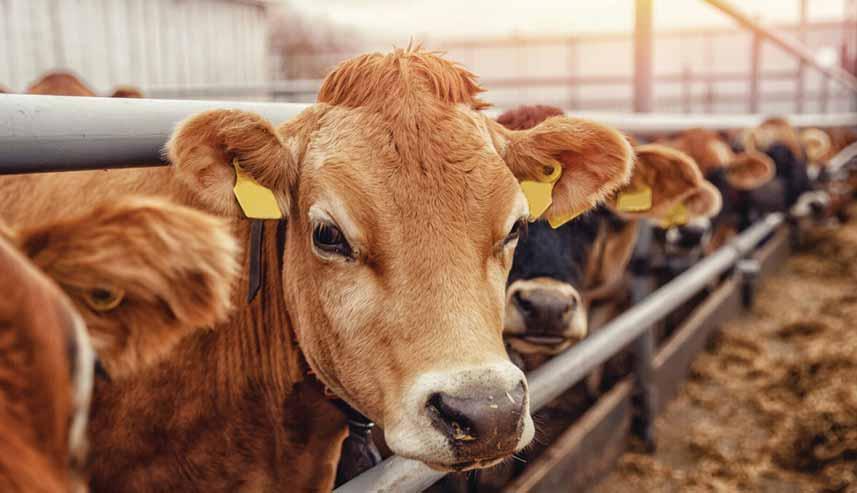 BY ANA DUMBADZE
BY ANA DUMBADZE
Artificial insemination provides a practical alternative to natural breeding for numerous farm animal enterprises around the world. Artificial insemination is a valuable reproductive technique in livestock production that offers several advantages, including genetic improvement, selective breeding, and disease control. Its primary advantage lies in the ability to introduce genetically superior sires, facilitating genetic improvement throughout the herd.
With artificial insemination, a successful pregnancy rate of 70% is possible on the first service.
As a result of artificial insemination, it is possible to get more productive offspring from local low-productive cattle. Instead of purchasing an expensive bull who can breed a handful of cows, ranchers can purchase hundreds of semen straws from a variety of high quality bulls for a fraction of the price, and then guarantee the breeding of those genetics into the herd via artificial insemination. Moreover, with artificial insemination, there is no risk of disease transmission or concern of death/injury to a highpriced bull.
Taking into account all the benefits of this practice, Caritas Czech Republic is carrying out a beef cattle breeding project with the support of Czech Development Agency, with one of the key directions being strengthening of artificial insemination in the target regions.
For this, the organization has so far implemented various activities:
Two practical two-day training sessions were held for a total of six artificial insemination specialists from the target regions, Khulo municipality, PshavKhevsureti, Tusheti/Alvani, involving practical instruction in artificial insemination. Local specialists, together with expert Ilia Mtvarelidze, visited the farmers of Gori municipality and carried out procedures. The farmers received infor-
mation from the expert about modern approaches, and refined the techniques of conducting artificial insemination.
Caritas Czech Republic purchased artificial insemination equipment and all the necessary tools for the awareness rising campaign. As part of the campaign, in summer 2023, in Khulo, the representatives of the organization, with local AI specialists, met more than 40 farmers in Beshumi. Further meetings took place in November in Pshavi, and in December in Alvani. At these meetings, along with introducing equipment and tools, they talked to farmers about the potential of artificial insemination.
The organization hired two specialists in Khulo and Alvani and carried out more than 60 artificial insemination procedures.
GEORGIA TODAY spoke to expert in the field, Ilia Mtvarelidze, and the specialists, Rezo Jabanishvili and Rezo Bolkvadze, to learn more about the benefits of artificial insemination for farmers and local economies in general.
Ilia Mtvarelidze told us that artificial insemination allows males to produce more offspring, and that, through this method, fewer males are needed and one can choose only the best males for use as fathers.
“When a farmer chooses artificial insemination, he gets improved milk production. Where, say, he previously milked 10 liters, the generation obtained by insemination, with good care, can get him a 70 % increase or even a double production. New generation male calves, meanwhile, might give the farmer an increase of 200-250 kilograms annually,” Mtvarelidze notes.
He claims that, along with other benefits, artificial insemination protects against brucellosis and other infectious gynecological diseases. It is materially very beneficial for farmers, because the generations obtained by artificial insemination can bring more income, and allows farmers to select genetics and varieties according to their goals.
Mtvarelidze says the most in-demand cattle breeds are the large dairy cow Holstein, which is the dominant dairy
breed worldwide, and the small-bodied dairy Jersey, which has the fattest and most caloric milk.
When asked what the full use of artificial insemination in animals will change in the future, Mtvarelidze tells us that, first of all, artificial insemination is expected to improve the economic situation of farmers, increase their income, as well as the number and quality of local products on the market.
“There are the best beef breeds, such as Brown Swiss Simmental, Fleckvieh, etc.,” Ilia tells us. “There are also pure meat breeds such as Angus, Limousin, Belgian Blue and more.”
In terms of statistics, the expert noted that, in artificial insemination, pregnancy and birth rates can be as high as 70-90%.
When asked about costs, he highlighted that no money needs to be spent on natural mating. “Artificial insemination is just much more beneficial,” he says. “It helps the farmer to achieve their goal,
and is an investment on their part to get a highly productive, highly useful breed, with results they can be proud of and that will be better appreciated.” Mtvarelidze has founded a school in Gori that teaches technicians the principles of veterinary and artificial insemination.
“Farmers can share their experience and help grow the number of specialists on the market. Right now, we lack motivated young people, but the support is there if they want it,” Mtvarelidze says. Alvani’s specialist, Rezo Jabanishvili, tells us that the demand for artificial insemination is increasing in Akhmeta municipality.
“Along with higher awareness among the population, the overall attitude has changed. Since the productivity of hybrid varieties has gone up, with Jersey and Angus being the most popular breeds in the region, the demand has increased,” he notes. “Statistically, where, in 2014, I
carried out 15 fertilizations a month, in 2023, I will do 50 a month, on average.”
“Anyone can benefit from this service – it’s affordable. Some people find that expensive, but those who have experience and know the gains they will get, realize the price is reasonable.”
Jabanishvili says the specialists and farmers he has met have both knowledge and experience in veterinary medicine and artificial insemination, and the current number of specialists in the region meets the current demand for artificial insemination.
Khulo’s specialist, Rezo Bolkvadze, also claims that the demand for artificial insemination is increasing in his municipality, and that the approach of the population towards the issue is changing and becoming more positive, especially when they see the results and safety benefits of artificial insemination.
“In the end, artificial insemination is cheaper than the natural process, considering the end results, and the population sees that,” he tells us. “Where, in 2022, I carried out 500 artificial inseminations, in 2023, it hit 600,” he says, adding that the most popular breeds among the local population in Khulo are Holstein, Jersey, and Swiss.
“The current number of specialists of the field here is managing to meet the demand in the municipality, however, more specialists would be ideal,” he notes. He says the knowledge and understanding of artificial insemination among farmers was relatively low at first, and while this knowledge has increased over the years, more awareness raising is needed.
“For our part, we try to inform locals, speak to them, deliver brochures, but more should be done to increase their knowledge, through trainings, presentations, etc., as the issue is still relatively new and strange to certain part of the population. More needs to be done to earn their trust and raise awareness,” he says.
This material was prepared as part of a project funded by the Official Development Assistance of the Czech Republic and implemented in partnership with the Czech Development Agency and Caritas Czech Republic.


GEORGIA TODAY MARCH 1 - 7, 2024 7 BUSINESS
New Identity Opportunities with Aerospike
Lineate Spotlight: Thoughts on the Future of the Ad-tech Industry
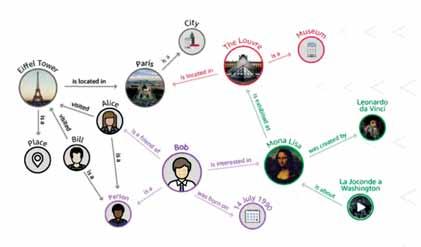
With the phase out of third-party cookies coming in the middle of Q4 2024, the urgency around identity solutions has reached a fever pitch among companies in the advertising ecosystem. Among ad tech companies, publishers, and advertisers, the user ID matching process is key to producing high-quality data for ad requests, reporting, and audience targeting. The value of building a graph of users, households, and devices is going to become more important than ever in maximizing value and generating the most relevant advertising. But capturing and linking all this data at scale has always been a significant technical challenge. The obvious choices of graph databases tended not to scale to the levels needed in ad tech, but the graph querying capabilities still need to be addressed. In 2022, we wrote a paper showing how we were able implement a scalable solution for identity graphs using HBase and Spark. Since that time, promising new technologies have emerged that offer the ability to broaden the capabilities of in-house identity graphs. Our early experiments with Aerospike Graph on AWS have been particularly promising.
MAPPING AN IDENTITY GRAPH
Maximizing value in digital advertising depends on getting the right message to the right people at the right time. In the ad tech world, much of this goal is accomplished with the ability to map first-party data, such as information known by a publisher about a particular reader, with anonymized behavioral or demographic information known to DSPs, SSPs, and other enrichers as well as third-party data providers. Matching these disparate data streams together gives ad tech companies the ability to produce compelling user profiles, and these profiles give publishers and advertisers the ability to provide a more relevant experience and achieve more effective results. In practice, every company in the chain is building an identity graph that maps users to relevant data, devices to users, users to households, and so forth.
On a technical level, this process means that companies need to match IDs from
many sources such as publishers, DSPs, SSPs, and other data enrichers and merge them with their own data and data they may acquire from other sources. Ad tech companies need to not only capture user and device data but also make it queryable and actionable for things like determining buyer intent, optimizing yield, building segments, and facilitating richer reporting and attribution. This need makes it crucial to combine all collected ID pairs into a useful identity graph. An identity graph helps advertisers get a full picture of a user’s journey through a marketing funnel across multiple browsers, apps, and devices.
For example, if a user looks for a product on his or her desktop computer, the advertiser is able to target that same user on his or her mobile phone, through email campaigns, or in social networks. So, this set of user IDs makes up an identity graph that stores the relationship between a user’s personal devices, browsers, IP addresses, or household devices.
As a result, ad tech companies and publishers need to store and join many different data sources. When dealing with these data sources, the main challenge is that tracking signals may come from the same user multiple times per minute, with thousands to millions of users coming each second, producing at minimum terabytes of data each day. Without a carefully designed architecture, the data volume becomes so large that it is not feasible to run a query against even one month’s worth of data, let alone make decisions at scale.
UNDERSTANDING THE TECHNICAL CHALLENGE
A user ID tracking system receives only pairs of IDs, not an entire set of IDs at once. For example, when a user logs into a website, the tracking system may need to map a site identifier to an email hash. Another may be a request to map a partner’s user ID to a company’s ID. Each of these pairs is separate, with each party or application offering only its own narrow identification of a user.
A tracking system’s main task is to build out the user/device graph, starting with a single pair of IDs and creating more complex relationships from there. The system evolves in real time, continually building out and enhancing the graph

as well as answering queries on the fly. At the same time, the entire graph must be usable at any time for merging into reports and interpreting large batches. This means it is a key requirement to not only store and query data but also to handle hundreds of thousands of insertions per second, almost 24/7, all while other applications are using the system uninterrupted (doing full-scan data jobs or single key-value or range-key queries). Our typical approach to handling ultrafast data queries at such scale has been to use databases with highly optimized key-value query capabilities, such as Aerospike or Redis. We have had a lot of success in particular using Aerospike in ad tech because it has demonstrated exceptional speed and recoverability as well as the ability to handle large data volumes with a relatively small cluster size. But the graph queries across the identity graph don’t lend themselves to such an architecture. At the same time, dedicated graph databases tend to work primarily on single node data volumes or on graphs that can reasonably be effectively sharded at design time, neither of which is practical in this use case.
SOLVING IN THE REAL WORLD
To take a concrete example, we had a client generating approximately a terabyte of tracking data each day. The cookie-based tracker alone produced more than ten thousand files per hour to analyze, and one of the partners supplied about 400 thousand files per hour. This data needed to be deduplicated, merged into a queryable graph, and used on a consistent basis. We built several proofs of concept using graph databases, key-value databases, and columnar databases and ran them through a series of tests to simulate ad tech workloads.
The fact that the dataset is a large graph suggests that graph databases would be an ideal choice for managing this task. For example, the built-in graph traversal features seem like an easy way to store IDs and their relationships and to quickly do multi-hop queries. For example, such functionality makes reaching an email hash through a browser cookie, or getting a mobile advertisement ID through an email hash, relatively simple to implement. The challenges of scale were clear, but the native graph query functionality was too promising to ignore.
However, we found the convenience of graph databases was outweighed by the challenges of scaling to the data sizes we needed. We experimented with Amazon Neptune, NebulaGraph, TigerGraph, and others, and we found that different graph solutions could store large amounts of data and make quick multi-hop ID queries. However, in ad tech, there is often a need to implement full table scans—for example, when a partner needs to join a company’s user or device data with its own and output a user intersection between the two systems. These wide queries proved problematic with all the graph databases we tried. In the end, we came to the conclusion that it would be easier to overlay certain graph query functionality on top of the database with better horizontal scalability than to attempt to incorporate horizontal scaling into a database with stronger graph capabilities.
BUILDING OUR OWN GRAPH
In the end, we elected to roll our own graph capabilities on top of Apache HBase deployed on Amazon EMR. By building custom indexes that store a predefined graph path in each record, we have been able to re-create the most important aspects of graph functionality needed for the ad tech use case. Not every graph capability we wanted was available to us, notably multi-hop lookups in arbitrary directions, such as from

email hash to cookie and back. But the key functionality, such as from querying device ID to cookie to email hash, works well in a production capacity. Apache Spark jobs on top of this allowed us to run the full table scans in parallel. Moreover, the Apache HBase solution scaled well. Our testing approach involved providing clean and prepared-for-insertion data of approximately 500 thousand ID pairs per second, each with different data retention requirements. (Different types of IDs have different lifecycles, so some IDs in the database needed to be stored for just a few weeks, but other types of IDs may need to be stored for multiple months.) More than 50 percent of the data consisted of duplicates that needed to be cleaned within a few minutes of insertion. The solution demonstrated response times in milliseconds even while full table scans were running. We have since incorporated similar architecture into production, and we have used this design approach in other high-scale projects, both inside and out of ad tech.
SEEING A NEW POSSIBILITY
Although we are proud of this solution and it has proven successful in the real world, it comes with inherent limitations. In particular, although we were able to maintain the very convenient graph abstraction over our datasets, we ultimately needed to hard-code precomputed query paths into Apache HBase indexes. This means that we need to know every type of graph query that will be done at scale at the time the indexes are built, and it means that the indexing burden grows exponentially with the number of query types. This is a standard limitation of solutions built on top of data pre-aggregation.
In the past year, Aerospike has released Aerospike Graph, which provides a convenient and familiar Gremlin Query Language interface on top of Aerospike core components. It leverages Apache TinkerPop to build graph computing capabilities on top of Aerospike’s engine. Aerospike Graph has the potential to dramatically simplify the custom indexing we have been implementing, tackling a majority of the use cases at higher
speed and supporting the ability for ad hoc graph queries, which our existing implementations currently lack.
We have had a very good experience using Aerospike as a key-value store and have seen exceptional performance in dozens of deployments (as well as our own research). It seems highly promising to perform multi-hop queries over such a low-latency back end. We have run Apache Spark on top of Aerospike, though it is not clear if this part of the system is suitable for the new Aerospike product. It is research we are currently undertaking.
CONCLUSION
Like so much in ad tech, there is no single silver bullet for maintaining an identity graph, but it can be done cost-effectively using the right technologies for each function. By writing our own indexes on top of columnar data stores like Apache HBase, we have been able to create productionready identity graphs that handle millions of incoming identity pairs per second while simultaneously allowing batch processing of datasets.
The challenge of such homegrown solutions is that they require significant customization based on the specific kinds of queries needed. We are constantly refining the solution to optimize for various needs and have implemented similar ones on technologies like parquet files on Amazon S3. One area in particular we continue to think about is how to make the graph query capability more flexible without introducing too much complexity. The recent release from Aerospike shows promise in our early tests, and we will continue to explore this database further.
Lineate is a leading implementer of cloud solutions, helping organizations scale their technology to manage vast data volumes and user bases. Our expertise in distributed systems along with our unique culture focused on knowledge breadth and creativity sets us apart in a competitive industry. With a global presence spanning seven countries, our client base is primarily in the United States and Western Europe.

GEORGIA TODAY MARCH 1 7, 2024 8 BUSINESS
Lawyer Gvantsa Zhorzholiani's Perspective on the New Personal Data Protection Law
From March 1st, revisions have been enacted in the Law on Personal Data Protection.
According to the changes, without prior consent, mobile operators and their SMS - service providers are prohibited from using citizens' personal data for direct marketing purposes. Furthermore, it is now mandatory for both, public institutions and some private companies to appoint a Personal Data Protection Officer.
Legal experts evaluate the revisions positively, although they acknowledge that companies may face certain challenges. To learn more, GEORGIA TODAY interviewed Gvantsa Zhorzholiani, a lawyer who serves as the executive director of CAPRINA’s Georgian office and is a member of the supervisory board.
GVANTSA, WHAT CHANGES HAVE BEEN MADE IN THE LAW ON PERSONAL DATA PROTECTION?
Before I address your question directly, I'd like to highlight that at CAPRINA, the company I represent currently, we are adapted to these changes already and prioritize the protection of our employees' personal data at a high standard. Hence, I commend our readiness to share the insights and experiences gained through the implementation process in our company over the past six months. I am ready to consult with everyone, individuals or companies who wish to learn more and implement the same high-level practice concerning personal data protection as we implemented successfully in CAPRINA.
Under the newly enacted law, which took effect on March 1st, an important innovation is the institution of Personal Data Protection Officer. This marks the emergence of a completely novel profession in the Georgian market.
Starting June 1, 2024, the appointment/ designation of a Personal Data Protection Officer will become mandatory for a number of organizations. These include public institutions (excluding religious and political organizations); insurance companies; commercial banks; microfinance organizations; credit bureaus; electronic communication companies; airline/airports; medical institutions that provide services to at least 10,000 data subjects annually; and organizations processing the data of a substantial number of individuals or conducting systematic and large-scale monitoring of their behavior.
The Personal Data Protection Officer is granted the authority to undertake additional responsibilities, provided that such actions do not create conflict of interest. The law allows companies to enter into service contracts with other companies to perform the functions of a Personal Data Protection Officer.
According to the new law, the Personal Data Protection Officer is required to possess substantial expertise in data protection. Drawing from EU standards, the Personal Data Protection Officer must be thoroughly familiar with the legislation governing personal data protection, best practices in the field of data protection, and ensure that the organization and its employees are informed, consulted and methodically assisted on a daily basis. It is crucial for the officer not only to have an in-depth knowledge of the legislation but also to possess a keen understanding of the organization's values and grasp its IT infrastructure.
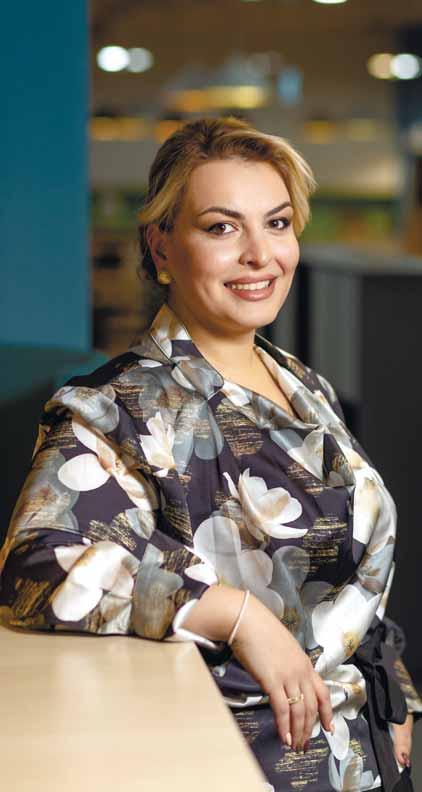
Organizations are mandated to provide the identity and contact details of the appointed or designated Personal Data Protection Officer to the Personal Data Protection Service within 10 working days of their appointment or replacement. Organizations are also required to publish the identity and contact information of the Personal Data Protection Officer on the website (if applicable) or by other accessible means. Our readers should take into account that violation of the legal obligation related to the appointment of an officer is an administrative offense.
Another important innovation is the prohibition of sending advertising messages to citizens without their consent. The revised law defines direct marketing as the direct provision of information to the data subject by phone, mail, e-mail or other electronic means in order to sell and/or support goods, ideas, services, work, as well as societal and cultural topics. Any other data processing for direct marketing purposes will require the prior written consent of the data subject. It is prohibited to send advertising messages to citizens without their consent. Organizations found in viola-
tion may face fines of up to 3,000 GEL.
The third notable advancement is the establishment of the rules and conditions of audio recording or monitoring in public or private spaces. Audio monitoring will be permitted if the data subject is informed beforehand and declares consent. Additionally, audio monitoring is allowed in remote communications and for the purpose of safeguarding personal safety, property, and confidential information.
The data processor is obliged to warn the data subject about this in advance or at the beginning of the audio monitoring.
Furthermore, the updated legislation obliges companies to report data security breaches to the inspectorate. In particular, any organization or individual that processes personal data is obliged to record all incidents of data security violations, results, measures taken, and to notify the Personal Data Protection Service no later than 72 hours after the discovery of the incident.
WILL THIS LAW APPLY
TO COMPANIES THAT ARE REGISTERED AS A
REPRESENTATIVE OFFICE OF A COMPANY IN ANOTHER COUNTRY, AND NOT A COMPANY REGISTERED IN GEORGIA?
Foreign enterprises and companies are afforded the opportunity to register a branch within the territory of Georgia. Registration serves various purposes, such as subjecting the entity to Georgian legislation, facilitating tax obligations, and fostering stability in civil transactions. However, it's important to note that registration does not confer upon the branch the status of a separate legal entity, and thus does not govern its conduct as such.
When a foreign company registers its representation in Georgia in the form of a branch, this branch is considered a part of that company and does not represent an independent company. However, if this representation is registered, such as in the form of a Limited Liability Company (LLC) within Georgia it will be considered an independent legal entity, which will be registered in Georgia. Both companies registered in Georgia and foreign representative offices are subject to Georgian legislation, including the new provisions outlined in the Law on Personal Data Protection.
AS A REPRESENTATIVE OF AN INTERNATIONAL COMPANY, HOW WOULD YOU EVALUATE THIS CHANGE, AND HOW EASILY WILL YOU BE ABLE TO ADAPT THE REALITY OF YOUR COMPANY TO THIS LAW?
At the outset of my discussion, I highlited that “Personal Data Protection Officer” is a completely new profession in Georgia. Within our company, CAPRINA, a subsidiary of the international holding FARAGOSTAR, with operations spanning across various countries including Luxemburg and Canada, I swiftly arranged online consultation sessions with my colleagues in these offices. It was very interesting to hear practical advice from them and to get the specifics of the operation of various modern platforms. In our company, personal information protection has been a priority for over two years, facilitated through cutting-edge applications that constantly update and safeguard employee information. In practice, we did not have an appointed Personal Data Protection Officer, although we did carry out data protection. I think this is very important for the company in the Georgian market. I believe that most companies lack the necessary information and experience in navigating the complexities of data protection. Providing practical examples and support can be immensely valuable in this regard.
As I’ve mentioned above, I commend readiness to share the insights and experiences gained through the implementation process in our company over the past six months. Such knowledge-sharing initiatives are crucial in fostering a culture of compliance and effective data protection practices within the business community. And, as I said, I am ready to consult with both individuals and companies who are willing to learn more and implement the same high-level practice concerning personal data protection as we implemented successfully in CAPRINA.
AS A REPRESENTATIVE OF AN INTERNATIONAL COMPANY, HOW OFTEN
DO YOU ENCOUNTER
PROBLEMS RELATED TO THE PROTECTION OF PERSONAL DATA IN YOUR COMPANY?
From the moment of the establishment of the company, employee registration and regular updates of their personal information have been integral practices. I am the executive director of a development company- in the field of construction. Depending on the specifics of the case, we have mostly temporary employees. Personal information about them is constantly updated, and after the completion of their work and the expiration of the contract, their personal information is destroyed. Adhering to labor laws, we automatically delete the personal information of job seekers if no employment contract is finalized. The biggest problem and challenge we have is the instability of the banking situation of employed persons. We have cases when, for various reasons, the employee does not want to have their salary transferred to their card and prefers to receive their salary in cash, which involves the creation of documents. In this case, different departments work simultaneously to protect the employee's personal and confidential information.
WHAT ARE THE BASIC PRINCIPLES THAT YOU, AS A LAWYER AND THE HEAD OF THE COMPANY, ADHERE TO IN ORDER TO PROTECT YOUR EMPLOYEES' DATA, AND HOW FAR DO YOU THINK THE GEORGIAN LEGISLATION IS ABLE TO DO THE SAME?
The priority of the new law is to enhance the protection of individuals and their personal information, which of course creates a feeling of security and stability. During the Covid pandemic, numerous regulations emerged, including the mandate for temperature checks, employee registration with temperature readings, and limits on office occupancy. With the construction process ongoing, as we had about 150 employees in the company, we decided to install a smart thermal video camera which would record people's attendance at work, measure their temperatures and save complete information on the employee's personal page. As a result, the occupational safety manager had constant information about the employees' reporting to work and their temperatures. Our initiative marked the first implementation of such a system in Georgia. This underscores the importance not only of safeguarding personal information but also of creating conducive work environments that prioritize employee comfort and motivation.
ACCORDING TO YOUR RECOMMENDATION AS A LAWYER, WHAT ADDITIONAL CHANGES CAN BE MADE IN THE MENTIONED LAW IN THE FUTURE?
It would indeed be beneficial if legislation offered more detailed guidance regarding the role of the Personal Data Protection Officer. For example, in the position of Labor Safety Manager, where normative acts are directly developed, it is defined what competence the person holding this position should have, what direct obligation they have during the performance of the service, etc. I hope that the status of Personal Data Protection Officer will improve over time, with additional supporting documents developed to provide further guidance.
GEORGIA TODAY MARCH 1 - 7, 2024 9 SOCIETY
Bringing Georgian Wine to New Heights
 INTERVIEW BY SHELBI R. ANKIEWICZ
INTERVIEW BY SHELBI R. ANKIEWICZ
Wine educator Daria Kholodilina, a Ukrainian native living in Georgia since 2013, was named the 2024 Emerging Talent in Wine Award on behalf of Georgia by the Global Wine and Spirits Community (IWSC) at this year’s London Wine Fair.
“Daria is making massive changes and moving the entirety of the Georgian wine industry forward,” said the IWSC judges. “She’s achieved so much – just her impact, her resourcefulness, the kind of work she’s doing – it creates markets and changes things.”
The judges were hugely impressed by how, in just a few years, since her move to Georgia from Ukraine in 2013, she acquired a deep knowledge of Georgian wine and became a highly respected figure in the industry. Daria co-wrote a
book on Georgian wine - Vinologue Georgia: A Guide to the Cradle of Wine; hosted a podcast and a radio show on the same subject, and started her own enotourism company – Trails and Wines.
In 2020, Daria spent three months driving around Georgia, visiting wineries and shooting interviews with winemakers. Her notes and interviews were passed on to the importers of Georgian wine in Germany, France, Switzerland and the Netherlands, helping them promote the wines. In addition, Daria organizes trainings on wine tourism development and runs multiple tasting events, presenting Georgian wine in its homeland and abroad.
The IWSC experts are said to have spoken highly of Daria’s work empowering Georgian winemakers, and educating the world about Georgian wines, while the judges admired Daria’s intention to spend her £2.5k travel bursary to give back to her community and further her impact. In her application form, Daria shared that she had two ideas for spending her bursary – an apprenticeship at a
European winery to deliver more insightful training sessions for Georgian winemakers; or representing small Georgian producers at one of the big trade fairs.
GEORGIA TODAY sat down with Daria to find out how she got started in Georgian wine, the platforms she uses to share her knowledge with others, and some tips for those wanting to enter the field.
“I became interested in wine when I was a teenager, just because I liked how versatile it was,” she tells us. “I would attend wine tastings with my parents when we were traveling, and I could smell the difference, though of course I was not allowed to drink at the time. Then I lived in Germany and tasted some there before I came to Georgia- and that’s a completely different world.
“I started visiting wineries and participating in more tastings and, from around 2016, I started to write about it in my blog.”
WHAT HAS YOUR JOURNEY WITH WINE BEEN SO FAR?
I started to attend courses in Georgia about what wine is and how it works, attending lectures, and growing my knowledge. Then, in 2018, I started a wine tours company, Trails and Wines, and became a wine guide. Then I published a book and got certified to the gold standard level by the Wines and Spirit Education Trust (WSET). My husband got on board, and we started working with other guides, and suddenly I was organizing all of them! After COVID hit, some importers reached out to me and asked if I could visit the wineries they were working with to check how the wine was and to record some videos. Once COVID wound down, I decided to host an in-person Georgian wine crash course, so people who live in Tbilisi don’t feel confused when they enter shops [wineries] and can make conscious decisions. After the course, I did a training to further package my knowledge. Then, in 2022, I was hired for a project as a wine tourism consultant for small wineries.
WHY DID GEORGIAN WINE PIQUE YOUR INTEREST?
I couldn’t realize why it was so different
A Winter Summons
BLOG BY TONY HANMER
Armenia will wait. I do have more to write about visiting Sevan, Dilijan, Vanadzor and more. But first, a more Georgian interlude…
Ever since a December 31 rockfall, house-sized, closed the road from Jvari up into Upper Svaneti, scuppering my January 1 travel plans, I have been itching to get back into proper winter. They cleared the road in a couple of days, but other set plans delayed me. Finally, in February, several things colluded to call me back up.
One was a young man’s funeral, about which I can say little except that it prompted the largest outpouring of grief I have yet seen from the many, many funerals it has been my sorrow to attend.
The day after that was our village’s
Lamproba, the joyful traditional late winter Svan religious holiday. Up until this time I had been calling it the Festival of Torches, because burning brands feature in it. But a couple of Englishspeaking Svans asked me to change this terminology, so I have done so. A kind neighbor had a spare birch log with one end split for me, as all households have for every male family member, present or absent. I filmed the whole thing (vertically) on my iPhone, in segments which when strung together totaled 18 minutes, and you can find it here: https://studio.youtube.com/video/ x7XLWen2Klg/edit
This trip actually marks a turn in my creative output. In addition to digital photography, I find myself filming all manner of moving subjects, making a start as an amateur videographer. The first inspiration this time came when I was on the Tbilisi to Zugdidi day train. Filming scenery from a wagon window,
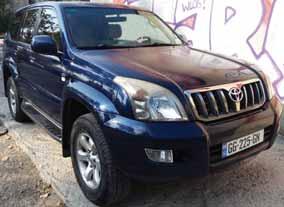

I noticed a very strange thing. The regularly spaced neighboring railroad ties, our speed and my camera’s video framerate were interacting. The result is a 9-minute shot in which the ties appear to be moving at exactly our speed, occasionally even going slightly faster than our train. Fascinating optical illusion: you can see it at https://studio.youtube.com/video/QIvwhNSHyY/edit
Finally, despite the ethnographic wonders of Lamproba, I have been discovering and photographing all manner of new shapes and beings in ice. I have to set out at no later than about 9:30am or the daily miracles will have melted in the cloudless sunshine which has been our only weather since I arrived 6 days ago. Our reported once-in-a generation snowfalls have largely melted, and the landscape now looks more like March than February. But the ice still comes back every night, to dazzle. Ever see a
at first. Everybody was talking about the tradition, but in 2014 and 2015, people were talking about skin contact and other details that I didn’t get. Then there were the random wine shops in the old town, and they would see this Slavic face and say, ‘Ooh, want some Kindzmarauli?’ I couldn’t figure out why it was so different until I started visiting wineries, and, at some point, I realized it was not only qvevri but this narrative in the world that there are two technologies: Kakhetian and Imeretian. That’s what they mean with skin contact and without skin contact, white wine. I was intrigued by this qvevri story and how it sometimes works and sometimes doesn’t, because all the homemade skin contact wines I tasted were too apple-y, cider-y, or tasted like regular white wine, so I wasn’t sure what to think of it. Then I tasted a really great amber wine in a shop, and I fell so much in love that I understood that’s where I wanted to dig. It was already an established community, and I was a bit shy, but I was also going to festivals and tastings, and I listened a lot, and tasted a lot, then I met people and became more comfortable. In the beginning, when I realized how good qvevri wine with skin contact is, this amber wine, how good it could be, I thought, ‘Whoa, different universe’.
WHAT IS YOUR MAIN GOAL NOW, MOVING FORWARD WITH GEORGIAN WINE?
To make Georgian wine better known. I relaunched my Instagram, dariko.drinks. wine, in December and decided that this page would be for wine content only. Now, after the relaunch, there are only wine people following my page, some of whom are also interested in Georgian wine. These are people from all around the world as well as Georgia. It’s in English, but I’m thinking of adding a part in Georgian, because I feel a lot of Georgians follow me because they find me interesting as a character, like this funny foreigner who came here and learned about wine, but they don’t understand a lot of things I’m talking about. I’m thinking of doing one post a week in
Georgian that includes basic wine education or on the wines of the world, something that Georgian people might not know about or would like to learn more about.
HOW DID IT FEEL WHEN YOU FOUND OUT YOU HAD WON THE 2024 EMERGING TALENT IN WINE AWARD?
The day I got featured in the top five, I happened to have a terrible headache, so I went to bed for a nap. When I woke up, I saw so many notifications, people congratulating me for being featured in the top five. Then I saw who was on the shortlist- women who are so brilliant and much further on in their wine studies than me. These were such cool, strong, people, and it was already an achievement to be among them. Then, one week later, I saw a bunch of notifications again and I was like, ‘No way’.
I think they picked me because I was representing the country, not a certain style. They give a stipend as a reward to use towards wine education, and when asked what I would do with it, I said I could do training with the small wineries, and if I want to attend a big wine event, I might think about it in advance and pick some wineries to represent who don’t have money or speak the language. This is one of my ideas.
WHAT’S YOUR FAVORITE WINE?
My favorite grape variety from Georgia is Kakhuri Mtsvane. My favorite producer is Marani Milorauli, whose Amber Mtsvane is delightful. Every vintage is very well made. I love it.
WHAT’S ONE TIP YOU WOULD GIVE SOMEONE LOOKING TO ENTER THE WINE INDUSTRY?
Attend some courses to expand your pallet and get an insight into how the world of wine works. I would start with WSET level two- it’s a week in Georgia in the classroom with an educator. It will give you broad knowledge, let you taste a lot of wine in a short period, and then you can already navigate the shelves in the big shops.

lion made of ice, no larger than your hand? Most of the other shots are abstract, but this one I’ll add to my Svan fairy tale bestiary with pleasure.
Much of what I have been shooting involves a macro lens, and ice much less than a millimeter thick, which makes an eggshell seem mighty in comparison. A breath would obliterate it. But careful quick shooting immortalizes it before it can melt. Minutes later, it might be gone. I am grateful for the time, and the vision, to seek, observe, discover and record new sights in my beloved Svaneti. Each season here is magnificent. But not eve-


ryone will crouch down on hands and knees to notice and see the tiny, temporary miracles which silently surround us. It’s a privilege.
Tony Hanmer has lived in Georgia since 1999, in Svaneti since 2007, and been a weekly writer and photographer for GT since early 2011. He runs the “Svaneti Renaissance” Facebook group, now with over 2000 members, at www.facebook.com/ groups/SvanetiRenaissance/ He and his wife also run their own guest house in Etseri: www.facebook.com/hanmer.house.svaneti



GEORGIA TODAY MARCH 1 7, 2024 10 SOCIETY CARRENTAL+995599787478 ToyotaPradoMercedesViano 55$50$70$ MercedesSprinter
Daria Kholodilina. Source: dariko.drinks.wine/IG
Teddy Award for Georgian Film. Berlinale 74 Review
REVIEW BY LILY FÜRSTENOW
Berlinale 74 will sadly go into history not for its films, probably not for its winners either, but for the infamous political scandals that overshadowed it all. Cinema as we used to know it is
in deep crisis, and so is Berlinale in the epoch of digital revolution, with its streaming services and videos on demand. The questionable merit of the films in the festival program certainly didn't give it any extra credit this year.
The Georgian films in the 2024 Berlinale program were not political enough to qualify for any official jury awards, in spite of the fact that documentaries were
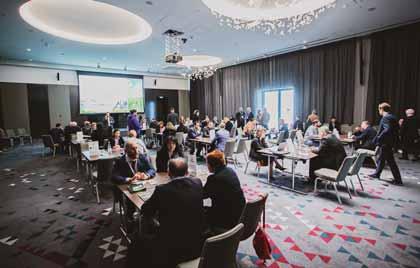
so in this season. Sadly enough, Lana Gogoberidze's moving and highly poetic work based on true facts and narrating the story of her mother - the first Georgian woman film-maker, brutally persecuted by the Stalinist totalitarian regime, didn't get any bears. "Deda-Shvili an game ar aris arasodes bolomde bneli" (Mother and Daughter or the Night Is Never Complete) was screened within the Berlinale Forum Special three times. (See our review in the previous issue of GT).
In his feature Crossing, Levan Akin, the Swedish filmmaker with Georgian roots, told the story of Lia, a retired teacher who made it her mission to find out what happened to her niece Tekla, who disappeared a long time ago. She learned from Achi, a neighbor, that Tekla may have left her native Georgia and was living in Turkey. Together, they set off in search of her. Istanbul welcomed them as a beautiful city full of connections and opportunities. Nevertheless, the search for someone who doesn't want to be found is harder than they thought. They meet Evrim, a lawyer who fights for trans rights. As the two women make their way through Istanbul's back-

streets Tekla's presence feels as ambiguous as ever before. "Crossing" received the Teddy Award for the Ensemble Cast and was the opening film of the Panorama section. The film was second best in the Panorama Audience Award. Greek film-maker Dimitris Athiridis' "Exergue - on documenta 14" accompanied curator Adam Szymczyk and his team over several years during the preparation of documeta 14. In this approximately 14-hour-long gripping documentary, viewers are taken behind the scenes of the intricate and often tumultuous world of exhibition making. From the competing interests of participating artists to the challenges of ill-managed budgets and curatorial egos,
the film offers a candid and emotionally charged exploration of the complexities inherent in bringing art to the public eye. Amidst the backdrop of capitalist societies, the documentary delves into the thorny issues of the value and ownership of art, shedding light on the elusive nature of artistic worth in the face of market pressures. Against this, the film chronicles the valiant efforts of curators to break free from conventional art market establishment, daring in vain to challenge the status quo in the pursuit of something off the beaten paths as long as and as far as Germany's state cultural/documenta funding would allow for. So much for films, politics and money.
Luca Polare Opens 2nd Branch in Baku
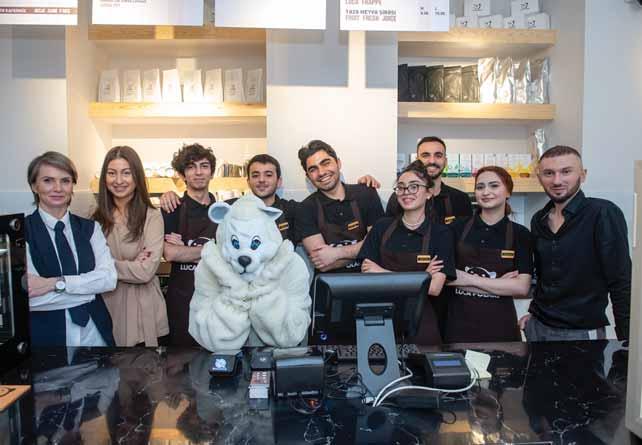
Luca Polare has inaugurated its second consecutive branch in Baku. The brand expanded beyond Georgia during the summer of 2023, establishing
production facilities in Baku and unveiling its initial branch in August. The second branch, featuring a distinct concept, was officially launched on one of the main streets on February 9. The company
PUBLISHER & GM
George Sharashidze
COMMERCIAL DEPARTMENT
Commercial Director: Iva Merabishvili
Marketing Manager: Natalia Chikvaidze
EDITORIAL DEPARTMENT:
Editor-In-Chief: Katie Ruth Davies
has disclosed plans to open several additional branches in Baku this season.
Tea Tabagar, the company's director, said: "We are continuing our development beyond Georgia. At this stage, we
Journalists: Ana Dumbadze, Vazha Tavberidze, Tony Hanmer, Nugzar B. Ruhadze, Mariam Mtivlishvili, Erekle Poladishvili, Shelbi R. Ankiewicz
Photographer: Aleksei Serov

have introduced a branch with a unique concept in Baku, distinguished by both its design and diverse product range. Notably, the branch includes a dedicated children's space, a novel addition. In the current season, we intend to open several more branches in Baku. I believe we will actively embrace the new season in Baku!"
The management of branches and production in Azerbaijan falls under the purview of the Georgian management,
even though local personnel have been recruited for the service, production, and logistics departments.
* Luka Polare is a cafe-ice cream chain offering customers approximately 100 types of ice cream and exclusive coffee. With 15 years of operation, the brand currently spans five cities across Georgia: 16 branches in Tbilisi, 5 in Batumi, 1 in Kobuleti, 1 in Kutaisi, 1 in Rustavi, and 2 branches in Baku, Azerbaijan.
Website Editor: Katie Ruth Davies
Layout: Misha Mchedlishvili
Webmaster:
Sergey Gevenov
Circulation Managers: David Kerdikashvili, David Djandjgava
GEORGIA TODAY MARCH 1 - 7, 2024 11 CULTURE GEORGIA TODAY
Melikishvili Str. Tbilisi,
Georgia
+995
GeorgiaToday ADVERTISING & SUBSCRIPTION +995 555 00 14 46 E-mail: marketing@georgiatoday.ge Reproducing material, photos and advertisements without prior editorial permission is strictly forbidden. The author is responsible for all material. Rights of authors are preserved. The newspaper is registered in Mtatsminda district court. Reg. # 06/4-309
ADDRESS 1
0179,
Tel.:
32 229 59 19 E: info@georgiatoday.ge F:





 BY MARIAM MTIVLISHVILI
BY MARIAM MTIVLISHVILI











 BY ANA DUMBADZE
BY ANA DUMBADZE






 INTERVIEW BY SHELBI R. ANKIEWICZ
INTERVIEW BY SHELBI R. ANKIEWICZ











